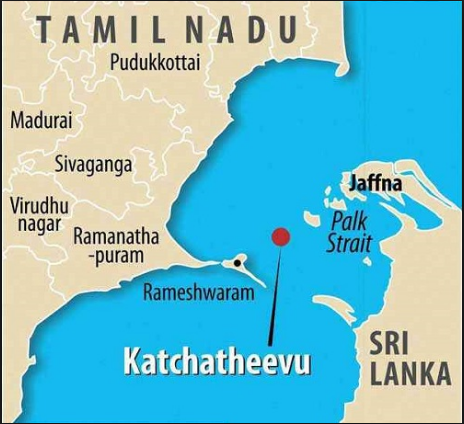Facts for UPSC Mains
India–Sri Lanka Fishing Dispute and Way Forward
- 12 Sep 2025
- 5 min read
Why in News?
The India–Sri Lanka fishing dispute highlights the need for a “humane approach” that balances fishing livelihoods with ecological conservation in the Palk Strait and around Katchatheevu island.
What is the India–Sri Lanka Fishing Dispute?
- Location: The dispute centers around the Palk Strait, the narrow body of water separating Tamil Nadu (India) and the Northern Province of Sri Lanka. Palk Strait connects the Palk Bay to the Bay of Bengal.
- Katchatheevu is a tiny, uninhabited islet in the Palk Strait. The dispute concerns this 285-acre island, which was ceded to Sri Lanka under the 1974 Maritime Boundary Agreement.
- While sovereignty is legally settled in Sri Lanka’s favour, Indian fishermen are allowed to visit the islet for drying nets and for religious purposes.
- Fishing rights remain a separate matter governed by historic practice, international law (United Nations Convention on the Law of the Sea (UNCLOS), 1982), and bilateral agreements.
- Katchatheevu is a tiny, uninhabited islet in the Palk Strait. The dispute concerns this 285-acre island, which was ceded to Sri Lanka under the 1974 Maritime Boundary Agreement.
- Communities involved: Traditional Tamil Nadu fishers and Sri Lanka’s Northern Province fishers have shared these waters for centuries.
- Key conflict: Indian mechanised trawlers enter Sri Lankan waters, engaging in bottom trawling, which is banned in Sri Lanka since 2017. This damages coral reefs, shrimp habitats, and depletes fish stocks.
- Small-scale artisanal fishers struggle to survive as mechanised trawlers pursue commercial profit, often damaging shared marine resources.
- The conflict is thus both cross-border (India–Sri Lanka) and intra-community (artisanal vs trawler operators in Tamil Nadu).
- High Seas Issues: Due to depleted fish stocks, Indian fishermen are increasingly venturing into the High Seas, leading to arrests in Maldivian waters and by the British Navy near Diego Garcia for allegedly crossing maritime boundaries.
What Measures Can Address the India–Sri Lanka Fishing Issue and Ensure Sustainable Fisheries?
- Distinguish livelihoods: Prioritise artisanal fishers who depend on traditional, sustainable methods. Phase out mechanised bottom trawling, which harms ecosystems and deprives both Indian and Sri Lankan small-scale fishers.
- Strengthen cooperation frameworks: Establish an India–Sri Lanka Fisheries Management Council with fisher groups, scientists, and officials.
- Use UNCLOS Article 123 to guide cooperation in the semi-enclosed Palk Strait and Gulf of Mannar.
- Consider joint quotas (similar to the Baltic Sea Fisheries Convention’s quota-sharing model), seasonal fishing rights, or regulated fishing days specifically for artisanal fishers.
- Invest in alternatives: Promote deep-sea fishing in India’s 200-nautical-mile Exclusive Economic Zone (EEZ) to reduce pressure on near-shore resources.
- Provide training, modern vessels, and financial support for fishers to transition away from destructive practices.
- Depoliticise Katchatheevu: Accept that sovereignty over Katchatheevu is legally settled under the 1974 Treaty. Debunk myths that it was “gifted” as historical records show Sri Lanka had stronger claims.
- Emphasise that fishing rights are separate from sovereignty and can still be negotiated cooperatively. Use Katchatheevu for joint marine research stations and as a hub for ecological cooperation.
- Foster community empathy: Highlight the wartime hardships of Sri Lankan Tamil fishers to build goodwill in Tamil Nadu. Encourage people-to-people ties, recalling Tamil Nadu’s humanitarian support during Sri Lanka’s civil war.
Conclusion
The Katchatheevu and Palk Strait issues should be seen as opportunities for cooperation, not conflict. A fair fisheries regime that protects artisanal livelihoods and ecology is key. Smaller disputes must not overshadow the larger vision of peace and mutual respect in South Asia.
|
Drishti Mains Question: Q. The India–Sri Lanka fishing dispute reflects the clash between livelihood needs and ecological sustainability. Discuss |
UPSC Civil Services Examination, Previous Year Questions (PYQs)
Mains
Q. ‘India is an age-old friend of Sri Lanka.’ Discuss India's role in the recent crisis in Sri Lanka in the light of the preceding statement. (2022)
Q. In respect of India-Sri Lanka relations, discuss how domestic factors influence foreign policy. (2013)







